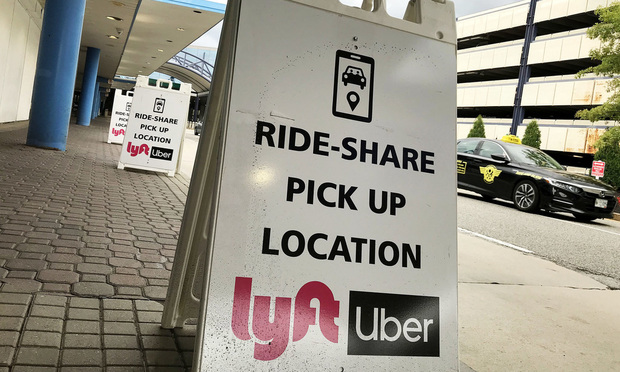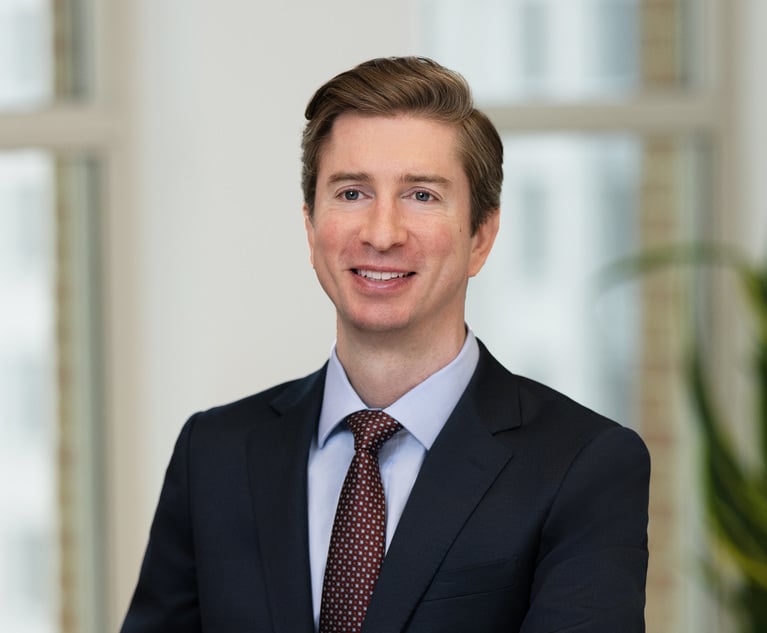Ga. Tech Professor's Transit Patent Asserted Against Lyft Is Indefinite, Tigar Rules
The decision aligns the judge with the Patent Trial and Appeal Board, and likely spells the end of a retired professor's suit against the ride-hailing company.
October 23, 2019 at 06:52 PM
3 minute read
 Photo: Diego Radzinschi/ALM
Photo: Diego Radzinschi/ALMIt's strike two for a former Georgia Tech professor who is suing Lyft Inc. and Uber Technologies Inc. for patent infringement.
U.S. District Judge Jon Tigar of Northern District of California ruled last week that all three asserted claims of Stephen Dickerson's 2004 patent on a "communications and computing based urban transit system" are invalid as indefinite. Dickerson assigned U.S. Patent 6,697,703 to his company RideApp Inc., and with backing from Kasowitz Benson Torres, sued Lyft Inc. last year.
Tigar's decision follows similar indefiniteness findings from the Patent Trial and Appeal Board earlier this year, and likely spells the end of RideApp's San Francisco suit. RideApp is still asserting the same patent against Uber in Georgia federal court.
Tigar wrote in his Oct. 16 order that although Dickerson described real-time tracking of users and vehicles using cellular communications and GPS, he didn't sufficiently explain how to do it. RideApp argued that figures and tables in the patent specification make it clear, and that a complex algorithm isn't required.
Tigar disagreed. "In this case, the '730 patent contains no algorithm whatsoever—simple or otherwise—describing how the invention performs the tracking function," he wrote.
The judge said that while he isn't bound by the PTAB decisions, he agreed that the patent also didn't sufficiently explain how to implement "a wireless means of on-demand allocation of a passenger to a specific vehicle." The claim specification includes a module called "Find Best Trip" that states, "Solves the trip assignment task based on available vehicles, their schedules, and their passenger loadings."
"Entirely absent from this description is any procedure for '[s]olv[ing] the trip assignment task,'" Tigar wrote.
"Given the lack of an algorithm for allocation, RideApp 'has in effect claimed everything that [performs the task] under the sun,' and the limitation is 'therefore indefinite,'" Tigar wrote, quoting the Federal Circuit's ePlus v. Lawson decision.
Lyft was represented before Tigar and before the PTAB by Baker Botts.
Partners Jeremy Taylor and associates Keith Jurek and John Gaustad appeared at the Oct. 15 claim construction hearing with Lyft's Sara Giardina. Baker Botts' team also includes partners Jennifer Tempesta, Bryant Boren Jr. and associate Betsy Boggs in district court, and partner Eliot Williams with Taylor and associate Chris Han before the PTAB.
Kasowitz partner Jeffrey Toney, one of the attorneys who appeared for RideApp, did not immediately respond to an email requesting comment Wednesday.
Kilpatrick Townsend & Stockton represents RideApp in the Georgia litigation against Uber. Uber, which is represented by Fish & Richardson, has asked U.S. District Judge Michael Brown of the Northern District of Georgia to dismiss the case on the ground that the patent is drawn to ineligible subject matter.
This content has been archived. It is available through our partners, LexisNexis® and Bloomberg Law.
To view this content, please continue to their sites.
Not a Lexis Subscriber?
Subscribe Now
Not a Bloomberg Law Subscriber?
Subscribe Now
NOT FOR REPRINT
© 2025 ALM Global, LLC, All Rights Reserved. Request academic re-use from www.copyright.com. All other uses, submit a request to [email protected]. For more information visit Asset & Logo Licensing.
You Might Like
View All
Meta agrees to pay $25 million to settle lawsuit from Trump after Jan. 6 suspension
4 minute read
How We Won It: Latham Secures Back-to-Back ITC Patent Wins for California Companies
6 minute read

Trending Stories
- 1Two More Victims Alleged in New Sean Combs Sex Trafficking Indictment
- 2Jackson Lewis Leaders Discuss Firms Innovator Efforts, From Prompt-a-Thons to Gen AI Pilots
- 3Trump's DOJ Files Lawsuit Seeking to Block $14B Tech Merger
- 4'No Retributive Actions,' Kash Patel Pledges if Confirmed to FBI
- 5A Texas Lawyer Just Rose to the Trump Administration
Who Got The Work
J. Brugh Lower of Gibbons has entered an appearance for industrial equipment supplier Devco Corporation in a pending trademark infringement lawsuit. The suit, accusing the defendant of selling knock-off Graco products, was filed Dec. 18 in New Jersey District Court by Rivkin Radler on behalf of Graco Inc. and Graco Minnesota. The case, assigned to U.S. District Judge Zahid N. Quraishi, is 3:24-cv-11294, Graco Inc. et al v. Devco Corporation.
Who Got The Work
Rebecca Maller-Stein and Kent A. Yalowitz of Arnold & Porter Kaye Scholer have entered their appearances for Hanaco Venture Capital and its executives, Lior Prosor and David Frankel, in a pending securities lawsuit. The action, filed on Dec. 24 in New York Southern District Court by Zell, Aron & Co. on behalf of Goldeneye Advisors, accuses the defendants of negligently and fraudulently managing the plaintiff's $1 million investment. The case, assigned to U.S. District Judge Vernon S. Broderick, is 1:24-cv-09918, Goldeneye Advisors, LLC v. Hanaco Venture Capital, Ltd. et al.
Who Got The Work
Attorneys from A&O Shearman has stepped in as defense counsel for Toronto-Dominion Bank and other defendants in a pending securities class action. The suit, filed Dec. 11 in New York Southern District Court by Bleichmar Fonti & Auld, accuses the defendants of concealing the bank's 'pervasive' deficiencies in regards to its compliance with the Bank Secrecy Act and the quality of its anti-money laundering controls. The case, assigned to U.S. District Judge Arun Subramanian, is 1:24-cv-09445, Gonzalez v. The Toronto-Dominion Bank et al.
Who Got The Work
Crown Castle International, a Pennsylvania company providing shared communications infrastructure, has turned to Luke D. Wolf of Gordon Rees Scully Mansukhani to fend off a pending breach-of-contract lawsuit. The court action, filed Nov. 25 in Michigan Eastern District Court by Hooper Hathaway PC on behalf of The Town Residences LLC, accuses Crown Castle of failing to transfer approximately $30,000 in utility payments from T-Mobile in breach of a roof-top lease and assignment agreement. The case, assigned to U.S. District Judge Susan K. Declercq, is 2:24-cv-13131, The Town Residences LLC v. T-Mobile US, Inc. et al.
Who Got The Work
Wilfred P. Coronato and Daniel M. Schwartz of McCarter & English have stepped in as defense counsel to Electrolux Home Products Inc. in a pending product liability lawsuit. The court action, filed Nov. 26 in New York Eastern District Court by Poulos Lopiccolo PC and Nagel Rice LLP on behalf of David Stern, alleges that the defendant's refrigerators’ drawers and shelving repeatedly break and fall apart within months after purchase. The case, assigned to U.S. District Judge Joan M. Azrack, is 2:24-cv-08204, Stern v. Electrolux Home Products, Inc.
Featured Firms
Law Offices of Gary Martin Hays & Associates, P.C.
(470) 294-1674
Law Offices of Mark E. Salomone
(857) 444-6468
Smith & Hassler
(713) 739-1250






